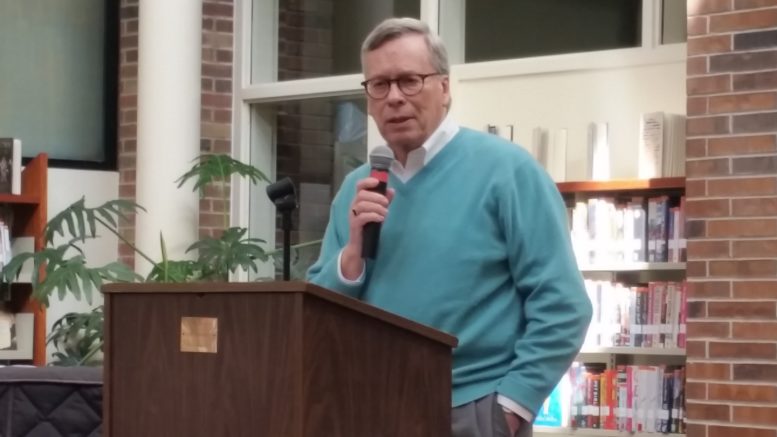By JAN LARSON McLAUGHLIN
BG Independent News
Bowling Green Mayor Dick Edwards is bucking President Donald Trump’s decision to withdraw from the Paris Agreement on climate control.
During Monday’s City Council meeting, Edwards said he is investigating joining the Climate Mayors national movement.
“Several residents have been in touch with me about the possibility of joining with mayors throughout the country in combating climate change and in preparing for global warming,” Edwards said.
“The intensifying of the environmental movement among mayors is proceeding on a bi-partisan basis in partial response to some of the proclamations emanating in recent days from Washington,” the mayor said.
Edward’s statement earned him an emotional thank you from council member Sandy Rowland, and applause in the council chamber from citizens and council members.
The mayor mentioned a recent NPR interview he heard featuring the mayor of Carmel, Indiana. That city, like Bowling Green, has no risk of the global warming risk from rising ocean waters. But the Carmel mayor also believes in the need for climate control efforts.
“Mayor (Jim) Brainard’s comments about Carmel could well have been said about Bowling Green and our efforts to be on the leading edge of environmental sustainability,” Edwards said.
Both mayors are Republicans and are bucking the trend of some in their party.
In the NPR interview, Brainard talked about why his community in Indiana cares about climate change.
“We see ourselves as a part of the country and the world. And we realize if there’s that sort of displacement, we’re at risk for all sorts of bad things,” Brainard said. “There’s also the frequency and intensity of storms in this area, tornadoes. There’s the changing climate patterns, which seems to lead to the evolution of new pests in the fields outside our metro areas.”
Brainard voiced his disapproval of Trump’s decision to withdraw from the Paris Agreement.
“I absolutely think he’s wrong. I think that it’s a failure of U.S. leadership at the federal level. But I want to make a point,” he said during the interview. “The mayors of the United States have been working since 2005. Over 1,200 mayors signed the U.S. Conference of Mayors Climate Protection Agreement. And a third of these mayors were Republican, probably two thirds Democrats – doesn’t matter. And we all made a commitment to reduce the carbon emissions in our cities.”
Brainard said Carmel is putting its principles into action by making its city more walkable, switching street lights to LEDs, creating more than 1,000 acres of parking, having a street tree program, and requiring city fleet vehicles to be hybrids or alternative fuel vehicles. The city is also experimenting with hydrogen trucks for its street department.
To climate skeptics in Carmel, the mayor talks about the economic savings of the changes, the reduced dependency on other nations for fossil fuels, and job creation in renewable energy.
In the NPR interview, Brainard said he believes Republicans have missed an opportunity to talk about the jobs and opportunities connected with climate control.
“Absolutely. I think some Republicans have. The administration has missed a political opportunity to expand their base. They’re speaking to a very small portion of the Republican base, and it’s a big missed opportunity for them,” he said.
Brainard and other mayors want nations to know that just because Trump backed out of the agreement, that doesn’t mean all Americans have given up.
“Simply because the federal government isn’t going to make progress, our mayors are going to continue to make progress. We’re going to keep our word. We’re going to honor the commitments made and continue to improve the air quality and reduce our carbon emissions in each of our cities,” he said.
Climate Mayors is a network of U.S. mayors collaborating on climate. There are no binding commitments as members, only that cities are pursuing actions to achieve an emissions reduction target through:
- Developing a community greenhouse gas inventory.
- Setting near- and long-term targets to reduce emissions.
- Developing a climate action plan aligned with the city’s targets.
Mayors representing more than 50 million Americans are working together to strengthen local efforts for reducing greenhouse gas emissions and supporting efforts for binding federal and global-level policy making.





